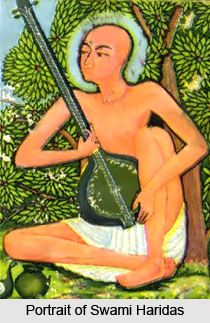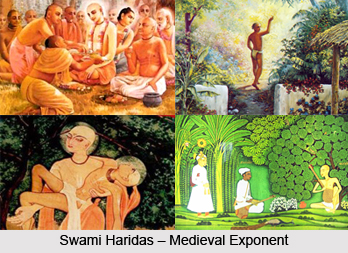 Swami Haridas was a famous classical musician and a spiritual poet who has been immensely admired for his compositions particularly in the `Dhrupad` style as well as innumerable compositions which can be attributed to him and are known as `Vishnupadas`. Swami Haridas is often said to be the incarnation of `Lalita Sakhi`, a dear and close friend of Radha, Swami Haridas is famously known as saint musician of North India. He is solely appreciated and credited for composing numerous devotional songs, apart from launching new technique of music. Swami Haridas had founded the `Haridasi school of mysticism` which is still existent in the northern portions of India. Apparently, Swami Haridas is the `guru` of the famous musician Tansen. He played a pivotal force in spread of Dhrupad music. It was his soulful language and melodious voice that inspired many people.
Swami Haridas was a famous classical musician and a spiritual poet who has been immensely admired for his compositions particularly in the `Dhrupad` style as well as innumerable compositions which can be attributed to him and are known as `Vishnupadas`. Swami Haridas is often said to be the incarnation of `Lalita Sakhi`, a dear and close friend of Radha, Swami Haridas is famously known as saint musician of North India. He is solely appreciated and credited for composing numerous devotional songs, apart from launching new technique of music. Swami Haridas had founded the `Haridasi school of mysticism` which is still existent in the northern portions of India. Apparently, Swami Haridas is the `guru` of the famous musician Tansen. He played a pivotal force in spread of Dhrupad music. It was his soulful language and melodious voice that inspired many people.
Early Life of Swami Haridas
The intricate details of the life of Swami Haridas are still shrouded in mystery and it is believed that he was born during 1512 close to the region around Aligarh District in the northern Indian state of Uttar Pradesh near Vrindavan. He was the son of Chitra Devi and Shri Ashudheer It is said that he had died in 1575. However, there exists yet another historical tale which states that Swami Haridas was born to Ganga Devi and a Saraswat Brahmin belonging to Multan. Soon after his birth, he arrived at Khairwali Sarak village alongwith his family and today this village is known as `Haridaspur` in his reverence. This particular record holds that Swami Haridas had died in the year 1607.
 Swami Haridas was quite learned in the sphere of Indian music and his teacher was Bhai Mardana who is believed to have played `rabab` during the time of Guru Nanak. Haridas is said to have employed musical instruments like `daff`, `kinnari`, `mridanga` and `aghouti` and sung the `ragas` including `Kedar`, `Basant`, `Gauri` and `Malhar`, amongst several more. Later, Swami Haridas had embraced the life of a saint and moved to Vrindavan which is considered sacred due to the presence of Lord Krishna and Radha at a point of time. He became a `sanyasi` at age of 25 and came here, where he built his hermitage in Nidhuvan and sang his own compositions dedicated to the immortal love of Radha-Krishna. He was a passionate follower of `Nimbarka Sampradaya`, the major Vaishnava tradition. The `Samadhi` or tomb of Swami Haridas is located in Nidhivan in Vrindavan.
Swami Haridas was quite learned in the sphere of Indian music and his teacher was Bhai Mardana who is believed to have played `rabab` during the time of Guru Nanak. Haridas is said to have employed musical instruments like `daff`, `kinnari`, `mridanga` and `aghouti` and sung the `ragas` including `Kedar`, `Basant`, `Gauri` and `Malhar`, amongst several more. Later, Swami Haridas had embraced the life of a saint and moved to Vrindavan which is considered sacred due to the presence of Lord Krishna and Radha at a point of time. He became a `sanyasi` at age of 25 and came here, where he built his hermitage in Nidhuvan and sang his own compositions dedicated to the immortal love of Radha-Krishna. He was a passionate follower of `Nimbarka Sampradaya`, the major Vaishnava tradition. The `Samadhi` or tomb of Swami Haridas is located in Nidhivan in Vrindavan.
Career of Swami Haridas
Swami Haridas, during the early part of his career was greatly supported by Raja Mansingh Tomar of Gwalior who was one of the front line promoters of Dhrupad. Raja Mansingh Tomar immensely helped him to make wonderful compositions. He was also greatly impressed by `Bhanu`, `Bakshu` and `Baiju`, the popular musicians in the courts. Almost all songs by Haridas were composed in `Brij` language, and those compositions are named as `Vishnupadas`, songs praising Lord Vishnu and his eighth incarnation Lord Krishna. In Vishnupadas the songs which do not praise Lord Krishna, are not recognized. He was very similar with the music of those times. He is considered to be a genius because of his simple composition skills and simplicity of the making.
Contribution of Swami Haridas to Music
Swami Haridas is credited with nearly 128 songs, out of which 110 are spiritual or devotional called `Keli Mala` and 18 are philosophical known as `Siddhanta Pada`. There are also songs which depicts the eternal love of Radha-Krishna. The songs illustrate complete devotion to God and separation from natural life. It is also known that he penned `tirvats`, `ragamalas`, and many other forms. Some of the renowned contemporary classical musicians of his time included Rupa Goswami, Chaitanya Mahaprabhu, Mahaprabhu Vallabhacharya, Harivansh Mahaprabhu, Hariram Vyas, Vitthalnath or Gusainji and others.




















